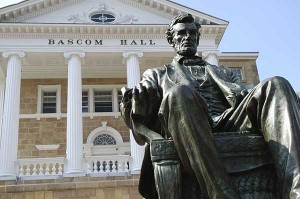 The University of Wisconsin System Board of Regents will meet in Madison on Thursday and Friday, December 9 and 10. The meeting will be held in the Gordon Dining and Event Center, 770 West Dayton Street. Webex coverage of the meeting is also available by registering here.
The University of Wisconsin System Board of Regents will meet in Madison on Thursday and Friday, December 9 and 10. The meeting will be held in the Gordon Dining and Event Center, 770 West Dayton Street. Webex coverage of the meeting is also available by registering here.
Regents are meeting in committee Thursday morning:
The Business and Finance Committee has many agenda items that relate to UW-Madison — a proposal to increase out-of-state tuition rates by 2%, generating an additional $8 million for the university; the approval of several agreements and contracts; the annual faculty turnover report; and a presentation that outlines a possible real estate strategy that would benefit the university economically.
The Education Committee will hear several reports, consider approval of 4 new degree programs at UW-Milwaukee, UW-Oshkosh, UW-Stevens Point and UW-River Falls, and discuss extending the temporary suspension of the requirement for ACT or SAT requirements for admission to UW System institutions through 2024-25,
The Audit Committee will hear several updates and reports on compliance and annual audits.
The Capital Planning & Budget Committee will consider granting approval to plan or revise several building projects, including the new Data Sciences and Engineering buildings. The committee will also hear a number of reports, including a presentation on UW-Madison’s proposed real estate strategy for future economic growth for the institution (mentioned above).
The Research, Economic Development & Innovation Committee will hear updates on UW-Madison’s biotechnology research and university-industry partnerships that could grow Midwestern technology hubs.
The full board will meet at 1 pm Thursday. Regent President Ed Manydeeds will provide an update on the UW System Presidential search and the UW-Madison Chancellor search. UW System Interim President Tommy Thompson will also provide an update on winter commencement and legislative and staffing issues before the board moves into closed session.
The board will meet at 8:45 am Friday morning and vote on committee action from Thursday. The board will also recognize the service of Regent Emerita Olivia Woodmansee. An optional closed session rounds out the agenda.

 Last week, University of Wisconsin Board of Regents President Ed Manydeeds
Last week, University of Wisconsin Board of Regents President Ed Manydeeds 
